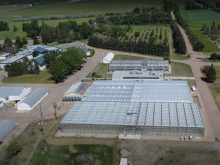A Health Canada scientist who evaluated the health risks of a beef growth hormone widely used in Canadian feedlots said Monday her doubts about its safety were over-ruled by a bureaucratic superior.
Margaret Haydon, one of four departmental scientists who have been battling the department over what they say are drug-approval decisions based more on corporate pressure than scientific caution, said the product Revalor-H was approved for use in Canada despite her recommendation for more study.
Three of her scientific colleagues agreed with her assessment.
Read Also

Alberta crop diversification centres receive funding
$5.2 million of provincial funding pumped into crop diversity research centres
Yet a more senior Health Canada bureaucrat, who had been in touch with drug manufacturer Hoechst Canada, approved the product, she told the Senate agriculture committee.
“None of us would recommend that it be approved for the Canadian market,” she said. “We were overruled and it is on the Canadian market.”
She said the senior bureaucrat who approved it over her objections later wrote a memo to his boss saying: “I’ve cleared the drug. The company is happy.”
The drug is implanted in heifer calves in feedlots to stimulate growth. It injects testosterone.
Haydon said one of the active ingredients in Revalor-H is “17 beta oestradiol.”
Last weekend, Reuters News Agency reported that a panel of European scientists has concluded the hormone 17 beta oestradiol “has to be considered as a complete carcinogen, as it exerts both tumor initiating and tumor promoting effects.”
The report is being debated this week by European Union officials. It will be cited by some as proof that the EU ban on import of North American beef produced with growth hormones should be continued, despite a May 13 World Trade Organization deadline to lift the ban.
Haydon said her concerns were not based on original research but on the results of studies in Germany, France and the United Kingdom.
She said there were few test animals used in each of the tests but the three independent tests produced similar results. They raised a health question.
Haydon has been ordered by Health Canada not to speak publicly about her concerns over internal product-approval practices. That gag order is being appealed to the courts.
However, she testified before the Senate agriculture committee under parliamentary immunity. She is one of four scientists who have been prominent in criticizing the department’s handling of the dairy production stimulator bovine somatotropin.














